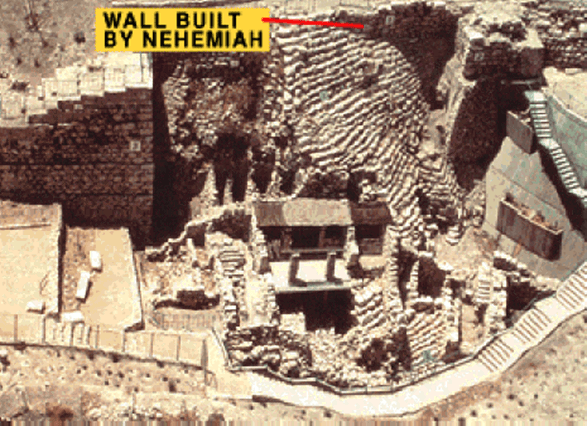Nehemiah Chapter 6 * The Great Conspiracy

Nehemiah Chapter 6
Gone to Mex & Back
“The Great Conspiracy”
Have you ever worked on a project that seemed to take forever? Maybe it was an important project, but you grew weary re-doing sections or adding to it or taking away from it. That’s how I felt last night, Typing, editing, tired. All I really wanted to do was watch television. For nearly a month my brother and I pilot-tested the 52-Day Challenge. We both ran into our own challenges that delayed the start-up date and sometimes life came between us and the Challenge. Tuesday, I cheated and wrote a journal entry for Monday. I was supposed to be in Chapter 7, reading Class Notes and Connections, but I was still editing Chapter 6. In my journal, I wrote:
Sunday, I got stuck on what to write regarding “To Mex and Back” for Chap 6. Didn’t like what I had written. It came too hard, so I moved on. Chapter 6 was exhausting. Kind of a preview of what’s to come in terms of editing and research. Not sure if I can keep up with the Challenge if I have to edit as I go.

Yup, I was discouraged. The next morning during my prayer and journal time, I confessed, “I’ve been feeling anxious about writing and finishing this book. Please send Your Spirit. S.O.S.” Immediately, I realized I was in the midst of the Challenge. My finishing this book as I keep up with the daily readings is my 52-Day Challenge. When I state “I can’t do this,” I limit God and myself. So, that was my hallelujah-aha moment.
I’ve had similar epiphanies before. When it happens in the middle of a chapter and relates to what I’m been writing. It makes what I’m writing very real. Jesus delivers an epiphany like an answered prayer that confirms I’m on the right path, and then happily I realize I’m not doing this alone. He is my partner. God will fight for me; God is fighting for me.
Actually, I love writing Nehemiah & Me. When I write about something like the strategies the enemy uses in Chapter 6 or how discouragement is part of a conspiracy, I tend to experience what I’m writing about first-hand. Ah, but to tell you all this before you get into the text is sort of a spoiler-alert. Let’s just say, Sanballat and Tobiah and Gesham continue to cook up more conspiracies, and the plot gets better, even more dangerous. Again, Nehemiah doesn’t give up or get discouraged. He keeps praying and working, until . . . well, you know. You’ll just have to read on to see what happens.
NEH 6: DAY 21 READY, SET, READ!

Section I: Conspiracy Against Nehemiah
1 Now it happened when Sanballat, Tobiah, Geshem the Arab, and the rest of our enemies heard that I had rebuilt the wall, and that there were no breaks left in it (though at that time I had not hung the doors in the gates), 2 that Sanballat and Geshem sent to me, saying, “Come, let us meet together among the villages in the plain of Ono.” But they thought to do me harm.
3 So I sent messengers to them, saying, “I am doing a great work, so that I cannot come down. Why should the work cease while I leave it and go down to you?”
Just like Sanballat had inside information on what was happening on the wall, Nehemiah had inside information concerning his enemies. Divine intervention played a big part in letting Nehemiah know. Rather than run and hide, he sent a message back stating the truth—he was too busy.
4 But they sent me this message four times, and I answered them in the same manner. 5 Then Sanballat sent his servant to me as before, the fifth time, with an open letter in his hand. 6 In it was written:
It is reported among the nations, and Geshem says, that you and the Jews plan to rebel; therefore, according to these rumors, you are rebuilding the wall, that you may be their king. 7 And you have also appointed prophets to proclaim concerning you at Jerusalem, saying, “There is a king in Judah!” Now these matters will be reported to the king. So come, therefore, and let us consult together.
After four letters, Nehemiah still hadn’t taken the bait, so Sanballat tried a new approach. A fifth letter full of lies and accusations to get Nehemiah’s attention. An “open” unsealed letter meant anyone, including the king, could read it.
8 Then I sent to him, saying, “No such things as you say are being done, but you invent them in your own heart.”
9 For they all were trying to make us afraid, saying, “Their hands will be weakened in the work, and it will not be done." Now therefore, O God, strengthen my hands.
Nehemiah’s response was to reject the lie without dwelling on the argument or expending energy to prove his innocence. Again, he turned it over to God. A great verse to remember: “Now therefore, O God, strengthen my hands.”

10 Afterward I came to the house of Shemaiah the son of Delaiah, the son of Mehetabel, who was a secret informer; and he said, “Let us meet together in the house of God, within the temple, and let us close the doors of the temple, for they are coming to kill you; indeed, at night they will come to kill you.”
Through divine discernment, Nehemiah knows that Shemaiah, a priest, is also an informant for Sanballat. Shemaiah warns Nehemiah that Sanballat is coming to kill him. He supposedly has Nehemiah’s best interests at heart when he says Nehemiah’s life is in danger, so he should hide behind the closed doors of the temple.
11 And I said, “Should such a man as I flee? And who is there such as I who would go into the temple to save his life? I will not go in!”
12 Then I perceived that God had not sent him at all, but that he pronounced this prophecy against me because Tobiah and Sanballat had hired him.
13 For this reason he was hired, that I should be afraid and act that way and sin, so that they might have cause for an evil report, that they might reproach me.
14 My God, remember Tobiah and Sanballat, according to these their works, and the prophetess Noadiah and the rest of the prophets who would have made me afraid.
Four verses, four insights. 1) Nehemiah makes it clear he is no coward; 2) God warns him not to trust Shemaiah; 3) Nehemiah knows his enemies are plotting to gather evidence to discredit him; 4) Previously, Nehemiah prayed “remember me,” now he prays, “remember Tobiah and Sanballat” (and the others) who seek his life and reputation. To oppose Nehemiah is the same as opposing God, especially since Nehemiah was doing God’s work. This call for God to “remember” those who oppose Him and those who serve Him is a recurring theme in Psalms when David’s life was in jeopardy.
Section II: The Wall Completed
15 So the wall was finished on the twenty-fifth day of Elul, in fifty-two days.
Finished at last! Their enemies defeated . . . or where they?

Source: warriorrevived.wordpress.com
Facts about the Wall (also known as the “Walls”
“The length of the walls is 4,018 meters (2.4966 mi), their average heights are 121 meters (39.37 feet) and the average thickness is 2.5 meters (8.2 feet). The walls contain 34 watchtowers and 7 main gates open for traffic, with two minor gates reopened by archaeologists.” https://en.wipipedia.org.
16 And it happened, when all our enemies heard of it, and all the nations around us saw these things, that they were very disheartened in their own eyes; for they perceived that this work was done by our God.
The fear of the nations was a testimony to the greatness of God, whose miracles, like the parting of the Red Sea, and His rescue of the Israelites were known to all the nations.
17 Also in those days the nobles of Judah sent many letters to Tobiah, and the letters of Tobiah came to them. 18 For many in Judah were pledged to him, because he was the son-in-law of Shechaniah the son of Arah, and his son Jehohanan had married the daughter of Meshullam the son of Berechiah.
Both, Tobiah and his son were married to Jewish women. Because Tobiah probably had in-laws and friends in high places, those people who supported him also provided him access to “privy” information about what was happening at the wall.
19 Also they reported his good deeds before me, and reported my words to him. Tobiah sent letters to frighten me.
NEH 6: DAY 22 CLASS NOTES & CONNECTIONS
There’s a conspiracy in the air. Another connection between Nehemiah and Jesus. The enemies of Nehemiah and Jesus try to trap them. Remember the key word is “trap.”
In this chapter, Nehemiah’s enemies conspire to put an end to the construction on the wall. They have private meetings and conference calls with other leaders who would like nothing better than to see Jerusalem fail and fall. The attack changed from intimidating the workers to smearing Nehemiah’s character with lies to discredit him as a leader. They even tried to befriend Nehemiah, when that didn’t work, they made it known that his life was in jeopardy.
What does Nehemiah do? He prays; he brushes them off; he refuses to take the bait, even when Shemaiah tries to lure him into the temple for his own safety. It’s sad that the enemy just doesn’t get it—God always prevails.
Even though the enemy knows that God is almighty and powerful, the enemy persists. Satan comes as a serpent or lion to devour us spiritually, even physically. Consider how Satan conspired to stop Christ from completing his ministry, even before Jesus was conceived; after that Satan tracked the Messiah from Bethlehem to the cross, yet the Son of God never veered from His mission.
Don’t be fooled into thinking the battle to rebuild the wall was over because the wall was completed. More conspiracies continued to crop up like mice in a grain bin. Satan’s age-old plan is to defeat Christian leaders, whether they are shepherds who lead a church, mothers who lead neighborhood prayer groups, God-fearing parents and grandparents, or a congregation of saints. If Satan can discredit them, divide and discourage them, he can cripple an entire ministry using the four strategies he used during Nehemiah’s time.
4 Strategies used against Nehemiah & his workers
- Compromise (Come, meet with us in one of the villages.)
- Slander & Lies (I’m telling the King you’re revolting.)
- Threats. (Men are coming to kill you.)
- Intrigue & Mystery (How did he know that?)
THE JESUS CONNECTION: Luke 13:21
The verse in Luke, “On that very day some Pharisees came, saying to Him, ‘Get out and depart from here, for Herod wants to kill You,’” reminds me of Neh. 6:10 when Shemaiah tells Nehemiah,
“Let us meet together in the house of God, within the temple, and let us close the doors of the temple, for they are coming to kill you; indeed, at night they will come to kill you.”
The enemy, whoever Satan uses as an informer, appears smooth and concerned. The job of the “secret informer” is to report back to the enemy if Jesus or Nehemiah takes the bait, so the enemy will know where to find Him. How did Jesus and Nehemiah respond?
Jesus says, “Tell that fox . . . I cast out demons and perform cures today and tomorrow, and the third day I shall be perfected (finished) (completed).” He knows what they are up to. When He says, “It cannot be that a prophet should perish outside of Jerusalem,” (Luke 13:32) He is foretelling what will happen; His mission, who He is, (see Zech. 9:9-10; “He shall speak peace to the nations.”) and where it will happen.
And then, instead of bemoaning His upcoming death, He is saddened by the fact that Jerusalem would not let Him into their hearts or close enough for Him to hold her and gather her children, and now they will pay the consequences. They will not see Him until the next time; and the “next time” is what Jesus was talking about in the first place, Luke 13:22, the way into the Kingdom. He brings us full circle. Actually, “full circle” for Jerusalem begins with the exile, then the period of restoration, then unbelief again. Jerusalem falls like a house of cards falls when God abandons the nation (compare to today’s events) until they are ready to be gathered.
Getting back to how Nehemiah responded to the cozy invitation to save his life, he asks, “Why should I hide?” It would make him look bad and his enemies, Sanballat and Tobiah could reproach him. What does Nehemiah do?
- He prays. He gives it to God. Remember, his enemies, he tells God. He doesn’t ask for protection.
- Tobiah’s letters are exposed.
- Next, the wall was completed.
- Consider Nehemiah’s and Jesus’s gentle natures; they don’t pray for themselves. They don’t call down God’s wrath.
- Again, Jesus and Nehemiah share the same temperament when they each discover what is going on in the temple and are not afraid to stand up to their enemies. (John and Neh. 13)
- Nehemiah and Jesus turn the invitation into a message: “Tell the fox this . . . “ says Jesus. And says Nehemiah, “I will not go in!”
- If we’re not careful, the enemy will use traditions and laws against us. Nehemiah could have been sentenced to die if he had been caught in the sanctuary. The enemies of Jesus actually used traditions and laws against Him so He was sentenced to die.

COMPROMISE
Compromise and cooperation is a good thing if moral issues are not involved. Nehemiah knew the enemies and Jews had nothing in common, no grounds for cooperation (2:20) Nehemiah had discernment and determination to build the wall. He refused to be intimidated by enemies. Leaders need to possess spiritual discernment if they meet with the enemy. Trust what the Holy Spirit reveals to you.
The bigger or wider the ministry is, if you’re not careful, it can take you away from home, even when you’re home-based. Beware of the enemy’s schemes to affect your spiritual self, your family, and your home.
Just how do you protect your walls and what you’ve already built? By standing firm in your decisions. Instructor and Pastor Michael Hanson said, “A decision based on conviction must stand; a decision based only on opinion might be reconsidered and subject to change.” When you are convicted to do something, nobody will stop you.
SLANDER, FALSEHOOD AND LIES (Vs. 5-9)
The unsealed letter was meant to scare Nehemiah. It accused him of plotting a revolt, and that he planned to be king. Nehemiah had supposedly appointed prophets to proclaim this in Jerusalem. He knew a good leader needs to be above reproach, so when Nehemiah’s reputation was threatened, he did three things:
- He denied their reports.
- He prayed to God for strength and to “strengthen my hand.”
- He went back to work. He brushed the enemy off saying he had no time for nonsense.
In Ezra, chapter 4, an enemy made false accusations in a letter to the king. He said the Jews were planning to revolt. Unfortunately, the letter worked, and the building stopped. Fast forward to Nehemiah, and the enemies’ attempt to again stop the rebuilding of the wall and the temple.
This time, after four letters failed to get Nehemiah’s cooperation, Sanballat sent his aide with an unsealed message, meaning anyone could look at it. The open letter was intended to intimidate Nehemiah and humiliate him. Sanballat wanted others to read the letter in hopes the king would squash any Jewish rebellion and put a stop to the work on the wall.
Sanballat had a plan to discredit Nehemiah and the Jews. He thought Nehemiah would react differently under the threat that the King’s governor might read the unsealed letter. The letter warned that Nehemiah wanted to be the king. Nehemiah simply responded to Sanballat that the open letter was a lie, thereby crushing Sanballat’s plot.
Today we use unsealed or open letters in the form of social media such as FaceBook, Messenger, Twitter, and even spam (something that goes out to everybody) to praise or discredit someone. Have you ever been on the receiving end of a rumor or accused of saying or doing something on FaceBook, and all of a sudden, you’re caught in a FaceBook war? How do you respond? When we are going through problems and false accusations, we need to pray (like Nehemiah) for God to touch hearts and strengthen hands. Don’t let rumors ruin your vision. Leaders cannot cave-in when they have problems caused by personal attacks.
THREATS
When ridicule and discouragement didn’t work, and slander failed, Sanballat hired Shemaiah, a pretend prophet who lived inside Jerusalem. By hiring Shemaiah, Sanballat took treachery to a new level. Shemaiah was also 1) a traitor, 2) a paid informant, 3) a good actor, and 4) a liar. His job was to convince Nehemiah to come to the temple. He even went so far as to shut himself in a house as if his life was endangered. “They’re going to kill you,” he told Nehemiah. “Hide in the temple and we’ll lock the doors. You’ll be safe there.”
Without spiritual discernment, Nehemiah might have agreed to enter the temple, but he knew if anyone was killed or a crime committed behind the sacred doors, the temple would be desecrated. Whoever was at fault would be killed. Didn’t sound like a win-win situation to Nehemiah. Therefore, he chose to trust God with his life. How about you? Like Nehemiah, are you willing to trust the LORD with your life?

INTRIGUE & MYSTERY
Verses 15-19 sent my head spinning. This was a tough one, trying to put all the pieces of the puzzle together. Nehemiah wasn’t interested in what Shemaiah had to say. The wall was finished, the gaps closed, all completed in 52 days. Did that mean Sanballat would pack up and go home? Of course not. Enemies don’t give up that easy. Sanballat and Tobiah found a way to get inside of Jerusalem, and obtain information that might help them discover a weak link.
The same is true in our lives. If we accomplish a project, get a ministry off to a good start or finish building our spiritual wall, does that mean Satan is finished with us? We wish. Most likely he’ll continue to try to tear apart our work and worry us however he can. Fortunately, like Nehemiah, we have God on our side.
With the Jerusalem wall finished, Sanballat, Geshem, and Tobiah were disheartened. They knew the Almighty God of the Jews had won. They didn’t accept God as their god, but they understood He was far more powerful than their own idols. He was a living God. The rebuilding of the wall in 52 days would count as a miracle and be remembered by all nations for all time. No doubt, Sanballat and Tobiah and Gesham’s ears were still ringing with the story of how the Israelites had captured Jericho, thanks to Rahab the harlot, long before they were born.

RAHAB AND THE JESUS CONNECTION: Joshua 2:8-14
Two men from the Israeli camp were sent to spy on Jericho. Rahab the harlot, having heard of God’s reputation, promised to hide the spies. She told them, “I know that the LORD has given you the land, that the terror of you has fallen on us, and that all the inhabitants of the land are fainthearted because of you. For we have heard how the LORD dried up the water of the Red Sea for you when you came out of Egypt, and what you did to the two kings of the Amorites . . . whom you utterly destroyed. And as soon as we heard these things, our hearts melted; neither did there remain any more courage in anyone because of you, for the LORD your God, He is God in heaven above and on earth beneath.”
Her confession saved her. She later became the mother of Boaz, the grandfather of King David, named in the genealogy of Jesus Christ (Matthew 1:2-16).
God being great was no mystery to the enemy nations of the Jews. Nor was it any mystery that Tobiah the Ammonite was Sanballat’s man and played a part in the ridicule and scare tactics. Here’s another shocker. Verse 17 confirms that Tobiah and his son were married to Jewish women. That could explain why so much letter-writing was going on between Tobiah and the Jewish nobles. The nobles praised Tobiah to Nehemiah, and then reported back to Tobiah whatever Nehemiah had said.
As the plot thickens, we learn these men of Judah were under oath to Tobiah. Evidently, Tobiah had convinced the nobles that it would be in their benefit if they worked with him. In their thinking, Tobiah was a good person and was to be trusted—or feared. They were pledged to him, meaning they worked with him so they could survive comfortably in the land. Most likely, they worked together as business partners. If those Judean nobles had been studying the word of the LORD, they would have had discernment, not involvement with Tobiah. They were more interested in restoring their own fortunes than restoring the lives of their brethren.
While Nehemiah was busy working, Tobiah kept busy with his letter-writing campaign, making friends and partners. This is where the strategy of Compromise also comes in. If we’re so focused on our work that we’re not paying attention to what else is going on, then the enemy can find a way to sneak into camp. Perhaps, first he’ll try to interest you or someone on your team to allow him in as a partner. Even if we believe a partnership will benefit our new ministry or project, we still need to watch out. We stand a chance of compromising our standards. What starts out as a business deal becomes compromised in order to survive comfortably, like the nobles of Judah. To “survive comfortably” is a choice King Solomon made to keep the peace with his many wives, but he had to compromise his beliefs for theirs—a very good reason why we shouldn’t be yoked to another individual with different values or a different belief system.
Ask yourself if partnering up in a business deal to survive comfortably is a good idea. Be cautious and honest about how it could affect you and everyone in your ministry or family. If you want to play it safe, remember two things:
- Stay near to God, let Him lead, and He will fight for you. His Spirit of Truth will give you discernment to help you know your enemies on the outside and inside of your wall.
- Pray that your hands will be strengthened. Not just your hands, but your legs to walk or run for the LORD, your ears to hear His voice; your eyes to see Him, your heart to be strengthened by His love.
NEH 6: DAY 23 NEHEMIAH & ME
Jan. 30, 2017 MY BD (The Big Distraction)
I was thinking about the verse “My delight is in the fear of the LORD.” Delight? Fear? I could understand being afraid of God, but to delight in being afraid doesn’t make sense. Should I delight in God being so fearsome? Then this A.M. from Nehemiah, Chap. 4 notes: If we “fear” the LORD, we won’t have to be worried or afraid of enemies or opposition. By “fearing” the LORD, He is pleased because we acknowledge His Greatness and Awesomeness, His Power. Amen.
Sanballat, Nehemiah’s enemy, worked to convince the laborers they should be afraid. Drop their rebuilding tools and run. Again, how did Nehemiah handle opposition? He didn’t drop his tools, he dropped to his knees (or maybe lifted his hands) and prayed for strength, “strengthen my hands.” (Neh. 6:9)
How can I apply that now? I fear failure. I fear I’ve given in to acknowledge pain and Face Book, tiredness, television—all Big Distractions. I fear I don’t know how to explain God or my beliefs. I stumble & stutter, then inwardly fear I’ve failed. LIES, LIES
The Truth: I belong to Christ. He is my beloved. He is also my Protector, Shepherd, Savior, Redeemer, King, and He will fight my battles for me as long as I “show up.” I love Him and yes, I fear He will discipline me. No, I fear discipline will hurt; like growing pains; however, pain is a form of growing, stretching our limits, strengthening mind, body, soul. My enemies have no power over me. “So, there, Sanballat! My delight in is the fear of the LORD!
April 5, 2017 Plateaus
The thought “Plateau” occurred to me this A.M. as I struggled to wake, to read, to pray, to praise. I’ve been like that for a week, blaming it on pain, drugs, tiredness. I’ve gone through all that for the past year, especially since coming to Lincoln. I get up early and often spend 2 hours in prayer and study. Okay, my affliction drives me out of bed early, but I’m at peace through prayer and study. Except lately . . .
Is it possible to reach a spiritual plateau, like we do sometimes in a career or on a diet? Zip along, confident, growing, alert, and then we stall.
PLATEAU #1. An area of high ground or level, flat; #2. A state of little or no change after a period of activity or progress. To get out or escape the plateau funk requires change—a different attack plan. Maybe I’ve been building or trying to restore the wall, get discouraged by the amount of rubble and work and the enemy’s taunts, so I complain and begin to slack off, when what I need to do is follow Nehemiah’s plan.
Nehemiah’s Plan
- He prayed for strength.
- He instructed the workers to be on the watch day and night against the enemy.
- Ephesians 6. “Put on the whole armor of God . . . for we do not wrestle against flesh & blood, but against principalities, against powers, against the rulers of the darkness of this age, and against spiritual hosts of wickedness in heavenly places . . .”
- “Take the sword of the spirit which is the Word of God.”
April 21, 2017 The Power of God vs. the Power of Darkness
Dear Lamb of God, my thighs are so sore, my calves ache constantly. Each moment in pain is like being in the scanner yesterday and told not to move for 30 minutes. I hurt, but couldn’t do anything, except pray. There it is LORD, the word, “Pray.” Remembering Neh. 4:7...
Now it happened when Sanballat, Tobiah, the Arabs, the Ammonites, and the Ashdodites heard that the walls of Jerusalem were being restored and the gaps were beginning to be closed, that they became very angry, and all of them conspired together to come and attack Jerusalem and create confusion. Never the less, we made our prayer to our God, and because of them we set a watch against them day and night.
Aha, another key word, “We.” Nehemiah wasn’t the only one praying. He was joined by everyone working on the wall. My enemies, pain, darkness, despair plot against me as my spiritual wall is being repaired and gaps are closing. They come together to cause confusion, and if that doesn’t work, they will plot to overthrow me and kill me. I am talking about the enemy wanting to destroy my Spirit—the Spirit of the LORD. And so, I must pray. The LORD will arm me and come to my rescue. Again, the Rx. Eph. 6: Our battle is not against flesh and blood, but against the powers of darkness.
And how many times has God promised to fight for us? What was Jesus doing when he crossed over into death? Was He not fighting the powers of darkness for us? So what did Nehemiah do? He prayed, and set a watch against them day and night.
Oct. 3, 2017 Day after Parathyroid Surgery
Discharged from Bryan East at 10AM, Cam picked me up and brought me home. Feeling good, legs need exercise. Zig & I reunited. Napped. Read Psalms 35-37.
My question, LORD, was if I should share the story of my healing with others. I did tell Dr. Wolfe’s PA, the nurses, assistant, Hospital Discharge Administrators, and whoever came into my room. I know, LORD, that You healed and sometimes forbid those healed to tell anyone else, but that is not the message I’m hearing. (Psa. 35:18) I will give You thanks in the great assembly; I will praise You among people. Psa. 35 is a call-to-arms, like Nehemiah’s prayers. When the attempts of those who threatened the workers failed, the enemies directly threatened Nehemiah.
David prayed in Psa. 35:19, “Let them not rejoice over me who are wrongfully my enemies. Nor let them wink with the eye who hate me without cause . . . they devise deceitful matters; they opened their mouth against me and said, ‘A-ha, a-ha!’”
Nehemiah’s enemies were also opening their mouth against him. In Chap. 6:6, Sanballat’s letter said. “It is reported . . . that you and the Jews plan to rebel . . . you are rebuilding the wall that you may be their king . . . Now these matters will be reported to the King.”
Like David, Nehemiah called upon God because his enemies were trying to make Nehemiah’s workers afraid, so they could not accomplish rebuilding.
The enemies said, “Their hands will be weakened in the work and it will not be done.”
Nehemiah prayed, “Now therefore O God, strengthen my hands.”
David & Nehemiah were constantly opposed by people who wanted them to fail. Through prayer, they called on God to remember them and the work they were doing, and to vindicate them. Just like Nehemiah prayed for God to remember his enemies according to their works. In Psa 35:26, David prayed for his enemies, that their accusations and tactics be turned against themselves. “Let them not say, ‘We have swallowed him up.’ Let them be ashamed and brought to mutual confusion.”
Oct. 4, 2017 “You hear me, LORD”
Dear Lamb of God. I slept well. Window opened. Fall chill in the air. Zig snuggled next to me. In my dreams, nothing fearful. More than once I was aware of my repeating, “Today, if I hear Your voice,” like an echo all night long. Today if I hear Your voice, Today if I hear Your voice . . . Let me harden not my heart. And may You, LORD, hear my voice.
(Psa. 38:15) Similarities between David & Neh. when enemies plot against them:
You, O LORD, I hope. You will hear, O LORD my God. For I said, “Hear me, lest they rejoice over me; lest when my foot slips, they exalt themselves against me.
Nehemiah constantly prayed. He often inserted, “Remember me.” I think that’s the same as David asking God to “Hear me.” I’ve prayed daily, “Today if I hear Your voice, let me harden not my heart.” I understand now, through David’s and Nehemiah’s prayers that it’s okay to ask God to remember me and hear my voice as well.
What did Nehemiah pray about? Praise, Confession; he reminded God of His promises. Other prayers were specific. “Strengthen my hands.” And, “Remember me, LORD.”
Oct. 5, 2017 Guarding Your Ways
Thunder. The voice of God. Thank You, LORD, for this morning, for the rain streaking the windows and flashes of lightning. You hear our prayers.
Psalm 39, Again, I was reminded of Nehemiah and his response to his enemies, just as David declares his silence before his enemies. David’s enemies taunt, mock, reproach him, invent lies, try to goad him to respond—to lose his temper or act out of anger, to veer off the spiritual path of trusting in God. Nehemiah’s enemies also tried to call him out with taunts and challenges. Nehemiah’s response was to ignore them by brushing them off.
(Neh. 6:4) I am doing a great work, so that I cannot come down. Why should the work cease while I leave it and go down to you?”
Jesus, too, did not argue or defend himself against those who were trying to stop His work.
(Psa. 39) The “Busy” Syndrome. I will guard my ways . . .
If only I can remember to do that. Too often I’m distracted by the enemy’s invitations resulting in (39:9) the “busy themselves in vain” syndrome. The enemy, jealous of the accomplishments of our God, will do anything to take our attention off God’s work or delay progress on our wall. The best way to respond: Ignore the enemy and go to God in prayer.
Oct. 6, 2017 MIRACLE CONFIRMATION
Looking thru Vol. 1, 2017 entries (yes, I went through more than one journal this year), I saw a scribbled note in the margin of April 27 reminding me of an Endocrinologist appt. for May 25. I remembered I cancelled it because I was still in Hip Replacement recovery from May 2nd surgery. The May 25th appt. would have been for my high calcium levels. Beneath the appointment time on the line below was written:
(Neh. 4:20) Whenever you hear the sound of the trumpet, rally to us there. Our God will fight for us.
Praise the LORD! The Healing verse.
It proves that NOW is the time to focus on moving
forward to help others as God has helped me. But how?
By following the example of Nehemiah—pray, plan, and wait until the LORD reveals the time is right or we are assured He has gone before us to strike the enemy, the ones who will oppose His plans.
Consider this a call to rally. Time to build and restore with the help of our God. How do you build (or rebuild) a house? Using the tools of Wisdom, Understanding, Knowledge (Prov. 4:3) and I Cor. 16:13, “Watch, stand fast in the faith, be brave, be strong. Let all you do be done with love.”
June 8, 2018 Ups and Downs
Thank You for the prayer time and meeting for the Children’s Evangelism group and the people who meet to pray for the children. Hear our prayers, please. I finally met Warren Wiersbe (Dr. Wiersbe). What a funny, funny man. He really made me laugh. He’s also a prolific author of many books about the books in the Bible, and wrote the BE Series (Be Determined is about Nehemiah). What a life he has led in ministry. God bless him. Remember him for what he has done for You.

YOUR TURN! Write about the challenges you face as you reconstruct your spiritual wall.
NEH 6: DAY 24 PRINCIPLES INTO PRACTICE
INSPIRATIONAL VERSE: NEH 6:9 They were all trying to frighten us, thinking, “Their hands will get too weak for the work, and it will not be completed.” But I prayed, “Now strengthen my hands.”
So far, every attempt by Sanballat, Tobiah, Geshem and the other enemies of Jerusalem, fail to thwart the plan of rebuilding the wall. Each attempt to discourage Nehemiah and the workers is counteracted by God answering Nehemiah’s prayers. This time, Nehemiah asks God, “Now strengthen my hands.”
I looked at this verse two ways. The first time, I assumed that Nehemiah was asking God to strengthen his hands so he could be a good strong leader and example to those who worked on the wall. After all, Nehemiah has been an example all the way through this book—one trait of a good leader is to roll up your sleeves and jump in. Still, I thought it strange that his prayer didn’t ask God to strengthen the hands of the workers. Perhaps Nehemiah saw the hands of the workers and his hands as one and the same. If that’s the case, then he was praying to God to strengthen their hands—all their hands. Without the hands of the workers, Nehemiah was unable to finish the wall; the workers needed his hands as well. When we see our leaders work hard and tirelessly, we join in; we follow their example; we are strengthened by each other.
How is your spiritual rebuilding coming along? Have you noticed how our opposition positions itself near the wall, watching our every move, hoping we’ll fall asleep during our watch and topple from the wall?
“Falling asleep” brings to mind Acts 20:9. “And in a window sat a certain young man named Eutychus, who was sinking into a deep sleep. He was overcome by sleep; and as Paul continued speaking, he fell down from the third story and was taken up dead.”
Who knows why the young man fell asleep. Paul’s preaching is hard to follow sometimes, or maybe Eutychus had a long day. Regardless, he fell out of the window, and died. Kind of a stiff penalty for falling asleep during a sermon. The good news is, Paul rushed down the stairs, threw himself on top of the young man’s body, and told everyone, “It’s okay, he lives.” And Eutychus did.
I wonder when Peter heard that story if he wasn’t reminded of a time he kept falling asleep. Jesus took John, James, and Peter with Him to the Olive Garden after they shared the Passover Meal. Throughout the meal, Jesus emphasized His time had come. More than once, he had told the disciples he was going to be crucified. In the garden, he asks them to keep watch and pray. Three times Jesus woke them. The last time He woke them, He told them, “It is time.” He had to go to meet his betrayer.
See how that works? We’re not only on top of the wall, we’re in the window. We’re not only in the window, we’re in the garden. No matter where we’re at, we need to stay awake and watch. One of the principles that Nehemiah enforced was to WATCH AND PRAY. Watch out for the enemy, pray for strength.
When prayed, “Remember me, LORD, for the good that I do,” he wasn’t being conceited or think he was better than anyone else. His prayers were intended for God’s ears only. He was comfortable enough with God to talk things over with Him.
From our lesson, we also learned that if we’re angry about a situation, take it to the LORD, to your prayer closet where you have complete freedom. You can pray anywhere, anytime, but when we need to vent, do it in private. Ask the LORD if He’ll remember you for the plans and hope you have to serve Him today and in the future. God wants you to vent.




